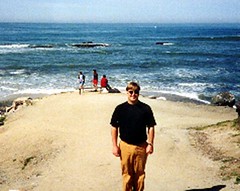1. Faulkner, Absalom, Absalom! (1938)As I've commented elsewhere, this list is surprisingly conservative in providing a narrowly focused view of one particular version of The South. Sure;y there has been a great novel or two in the last 30 years or even longer since the passage of the Civil Rights Act in 1964! Later this week the online OA will publish the longer list from 11-50 and that's probably where the more interesting action will be. For now my thoughts. 3 Faulkner's is too much, but he's important enough I don't mind seeing him twice. I'd lose The Sound and the Fury Myself. Penn Warren's mess of about four different novels shoved together is really overrated at 2 here. I'm not convinced Invisible Man really belongs on a list of great Southern novels although I do realize it has the "Tuskegee" section. Personally I'd replace it with another forgotten Harlem Renaissance classic, Jean Toomer's Cane (1923). I'd put something modern in the place of the third Faulkner and perhaps something urban. Maybe a Florida noir by John D. MacDonald—say The Deep Blue Good-by (1964)—or something Appalachian like Ron Rash, Serena (2008) or Sharyn McCrumb, She Walks These Hills (1994). For a quirkier old school selection I'd go with George Washington Cable, The Grandissimes (1880).
2. Robert Penn Warren, All The King's Men (1946)
3. William Faulkner, The Sound and The Fury (1929)
4. Mark Twain, The Adventures of Huckleberry Finn (1885)
5. Harper Lee, To Kill A Mockingbird (1950)
6. Walker Percy, The Moviegoer (1961)
7. William Faulkner, As I Lay Dying (1930)
8. Ralph Ellison, Invisible Man (1952)
9. Flannery O'Connor, Wise Blood (1952)
10. Zora Neale Hurston, Their Eyes Were Watching God (1937)
1. Agee & Evans, Let US Now Praise Famous Men(1941)Sure this list avoids the former's time-boundedness, but it is still pretty conservative and presents a kind if old fashioned monolithic view of the South. Agee & Evans at number one is a well-earned given as was Absalom, Absalom! I'm glad to see W.J.Cash gte his due rather than being trashed as some kind of racist by ex post facto. holier than thou academics. I'd jettison both 4 and 5 from my top 5. I was at the Harvard lectures which became One Writer's Beginnings. Professor Costello is right that this book represents an idealized and nicer little old lady version of Welty. It was also Harvard University Press's first NY Times bestseller but I'm not sure it rises to the level of greatness. Similarly I think Foote owes his prestige more to his appearance on Ken Burns' miniseries than he does for the impact of his extended history. What do I put in their place? My Mississippi book would be Willie Morris, The Courting of Marcus Dupree (1983), discussed more here. Food being so important to the South, I'd think long and hard about a food book and perhaps go with a book about food rather than one of numerous cookbooks, so John T.Edge, Southern Belly: The Ultimate Food Lover's Companion to the South (2000).
2. Richard Wright, Black Boy(1945)
3. W.J. Cash, The Mind of The South (1941)
4. Eudora Welty, One Writer's Beginnings (1984)
5. Shelby Foote, The Civil War: A Narrative (1958-1974)
A few other serious contenders would include something by C. Vann Woodward from the list The Strange Career of Jim Crow (1955), The Burden of Southern History (1968), Origins of The New South (1951), or Mary Chestnut's Civil War (1982) any of which could be seen as a corrective to Cash. For reportage and because it became even more relevant after Katrina, John M. Barry, Rising Tide: The Great Mississippi Flood of 1927 and How It Changed America (1998). Barry's book really helped me understand the area I had moved to when took my job at Mississippi State. Penn Warren shows up either in I'll Take My Stand: The South and The Agrarian Tradition (1930) or with Cleanth Brooks, Understanding Poetry (1938). Finally one personal quirky favorite would be Gloria Jahoda, The Other Florida (1967). The essay, "Two Hundred Miles from Anywhere Else," remains the best explanation of why my hometown Tallahassee, FL is unlike any other "city in Florida, or in the South" (128).
Little Feat at the Rainbow Theatre London 1977
UPDATE [Saturday, September 5 9:37 AM]
The full Oxford American Lists were released yesterday for Underrated, Novels and Nonfiction. As I expected this is where the real interest in this categorizing/listing project lay. I was pleased to see many of my alternate suggestions there and some just outside the Top 5 or 10. For example if you collate the split votes for C. Vann Woodward across the 4 works I mentioned he gets to 22 and is 6th on that list. I was also leaed that one novel and one nonfiction pick of mine were unique (MacDonald and Edge).

1 comment:
I liked it.
Bathmate
Post a Comment